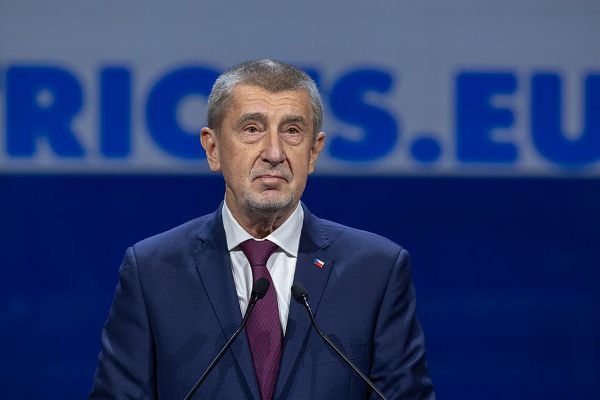Czech oligarch Andrej Babiš has achieved a significant victory in the recent parliamentary election in the Czech Republic, as indicated by nearly complete results released on Saturday. He joins the ranks of other far-right leaders in Central Europe, such as those in Hungary and Slovakia, who pose a challenge to the European positioning of their respective countries. Babiš plans to halt support for Ukraine and adopt a more pro-Russian and pro-Chinese stance.
As of the latest count, with 99.5% of polling stations reporting, Babiš’ ANO (YES) movement secured 34.7% of the vote, surpassing the Together conservative coalition, led by Prime Minister Petr Fiala, which received 23.2%. This victory positions Babiš alongside pro-Moscow Prime Ministers Viktor Orbán of Hungary and Robert Fico of Slovakia, both of whom have declined to provide military aid to Ukraine, continued importing Russian oil, and opposed European Union sanctions against Russia.
In contrast, the Czech Republic has been a steadfast supporter of Ukraine since the full-scale invasion by Russia in February 2022, supplying arms—including heavy weaponry—to the Ukrainian armed forces and spearheading initiatives to acquire critical artillery shells from non-EU countries.
Babiš expressed his disapproval of the aforementioned international initiatives, stating, “We have a different view of it.” His opposition party, which has gained traction through the dissemination of misinformation via social media, has attributed various recent challenges—including the energy crisis and rising inflation—to Fiala’s administration while pledging to reverse pension reforms and reduce aid to Ukraine.
Fiala acknowledged the election results, emphasising their clarity and necessity for acceptance. “I congratulate the election winner, Andrej Babiš, and I also extend congratulations to all participating parties on their gains,” he posted on X (formerly Twitter).
Fiala’s campaign focused on security issues and the implications of the Russian invasion of Ukraine. He stated, “The Together coalition has borne the primary burden of all the crises faced by the Czech Republic in recent years. We have navigated significant security and economic challenges and have made several unpopular yet indispensable decisions. We have honoured our promise to restore the cohesion of the Czech Republic. Today, we can proudly say that we are energy-independent from Russia and are progressing in infrastructure development at a rate that exceeds that of Poland, while also surpassing the economic growth of both Austria and Germany.”
The mayors’ group, known as STAN, which is part of Fiala’s government, received 11.1% of the vote, and another ally, the Pirates party, secured 8.7%.
Meanwhile, the major anti-migrant and pro-Moscow party, Freedom and Direct Democracy (SPD), saw a significant decline from an expected 10-12% to a final 7.9%. The “MAGA” Motorists party received 6.8% of the vote. Overall, the diverse positions of these parties pose potential risks to the stability of a coalition government, which could limit Babiš’s capacity for flexible governance. Recognising the challenges of partnering with far-right factions, the former Prime Minister indicated a preference for establishing a one-party government while seeking support from far-right parties.
The two-day election resulted in the allocation of 200 seats in the lower house of the Czech Parliament. Babiš’s ANO party won 80 seats, while the Freedom Party secured 15 and the Motorists party obtained 13 seats. The Together coalition captured 52 seats.
Babiš’s ANO party is associated with Hungary’s Viktor Orbán’s Fidesz as part of the far-right alliance known as “Patriots for Europe,” which is led by Marine Le Pen‘s National Rally. The SPD, led by Tomio Okamura—a long-time supporter of Le Pen and previously a member of her far-right group—was excluded from the Patriots in 2024 without clarification, subsequently aligning with the more extremist AfD in the pro-Moscow “Europe of Sovereign Nations” (ESN) group. The SPD aims to advocate for the Czech Republic’s exit from the EU and NATO and seeks to expel many of the approximately 380,000 Ukrainian refugees residing in the country. Nevertheless, Babiš declared his continued commitment to being “pro-European and pro-NATO” following his victory.
President Petr Pavel is scheduled to convene with Babiš and other party leaders on Sunday. Typically, the leader of the dominant political force is granted the opportunity to form a new government. Should Babiš opt for a singular governmental approach, his minority cabinet would require at least some level of support from the SPD and the Motorists to secure the necessary parliamentary confidence vote.
However, it remains uncertain whether a coalition under Babiš would prove stable. Consequently, President Petr Pavel’s influence may grow, as he sets strategic policy parameters, including those related to EU and NATO membership, support for Ukraine, and an increased defence budget.
It is noteworthy that a coalition of four far-left parties, openly aligned with pro-Russian sentiments and led by the Communists, failed to secure any seats in the parliament.
(This article used information from the Associated Press)

